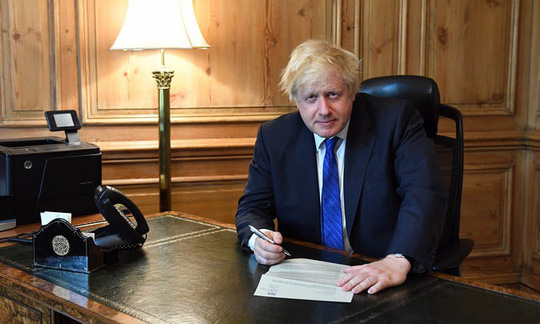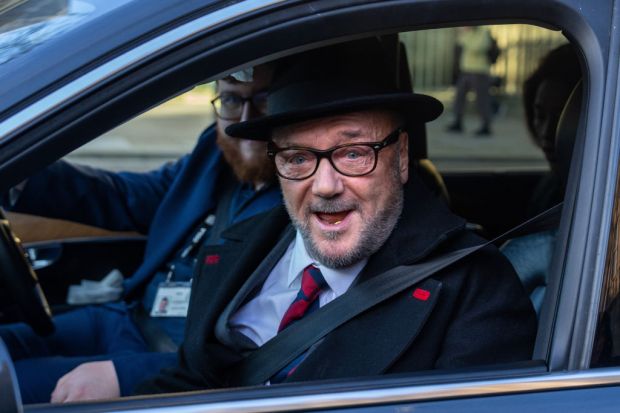Boris Johnson has been out of action for almost a fortnight.
His last meaningful act before going into hospital was to force frazzled Health Secretary Matt Hancock to ditch a threat to ban outdoor exercise that he’d made live on TV in response to some tweeted pictures of people sunbathing in a park.
In place of that threat, Johnson’s Downing Street changed the tone by sending out a message telling the British public ‘thank you, thank you, thank you’ for their efforts.
Though the Government initially claimed Mr Johnson would work on his red boxes and receive briefings while in hospital, this did not actually happen (no doubt due to his rapid deterioration). Downing Street confirmed on April 13: “He didn’t receive any papers while in hospital.”
Since coming out of hospital on Easter Sunday, the Prime Minister’s sole contribution to public life has been to record a much-lauded video message to the nation within hours of his discharge, praising the NHS for saving his life and again praising the British people for their heroic efforts on social distancing.
Then he went to Chequers and he has been completely secluded from the Government since then – recuperating full-time under the watchful eye of his heavily pregnant girlfriend.
So what has happened during his two-week absence, first in hospital and then at Chequers? I suggest that the answer is the Government has lost its way.
Let me summarise: Mr Hancock has resumed a hectoring tone that appears guaranteed to get people’s backs up; Communities Secretary Robert Jenrick has retired hurt to his half of Herefordshire; the police have organised mass gatherings to applaud themselves and NHS workers while also harassing people sitting alone on park benches; the Chief Scientific Adviser has started mulling aloud about the wearing of face-masks, admitting they appear to be good at limiting transmission of the virus (ie saving lives and potentially allowing normal-ish life to resume) but only committing to having a chat about the issue with colleagues at a meeting scheduled for next Tuesday; an under-briefed junior minister was thrown into the television lion’s den inhabited by Piers Morgan and started laughing (nervously) down her badly-lit home video link as she was progressively dismembered.
Worst of all, the remaining Cabinet ministers have alighted on a risible Catch-22 formula for batting away all questions about when we might emerge from the lockdown that is progressively destroying so many livelihoods. Their argument goes like this: we cannot talk about how we might leave lockdown or when because even to talk about that will encourage people to flout lockdown right now.
Once again the British public, who have been overwhelmingly responsible and well-behaved, are being defined as the problem by their governing class – infants not to be trusted with the full picture, just to be commanded how to behave.
Worse still, the Cabinet remnants appear to have simply taken down at dictation speed – without deploying any wider political intelligence or judgment – a series of prohibitions penned by officials about the lifting of lockdown. The last of the five is that we cannot leave lockdown if there is a risk of a second peak of infections.
According to Alok Sharma, the Cabinet tail-ender with a somewhat pompous manner who was entrusted with the Downing Street briefing on Friday, this final criterion is the most important.
Yet it is a logical nonsense. Any relaxation of lockdown measures must necessarily entail some risk of a second peak of infections. Relaxation will involve allowing person-to-person interactions to increase. It must, by its very nature, carry a risk of infections rising again (“second peak”).
The “gotcha” contingent of broadcast political editors has been handed an unforgiving yardstick with which to beat ministers. If there is any significant rise in infections, hospital admissions or daily deaths after the relaxation of the lockdown they will be able to berate ministers for failing one of their own key tests. This means that no minister will dare to recommend the lockdown is lifted, no matter how strong is the overall case for doing so.
No minister, apart from one, of course. Boris Johnson, master communicator and – however much his detractors might dispute this – master strategic thinker. He alone has the authority and the gumption to get things back on track.
It is unfair to blame Dominic Raab for being an inferior stand-in. It was already known that conveying empathy was not a strong point of his and as “First Secretary of State” he has not been passed full prime ministerial-level authority to take key decisions.
One week without the Prime Minister being at his desk was manageable. But two weeks of it has led to a palpable sense of drift. To go into a third week in a sterile holding pattern, with no prime ministerial input or public presence whatever, will be asking for trouble.
It is easy to understand the qualms of Mr Johnson’s family and friends about thrusting the cares of office back upon his shoulders. Undoubtedly such a degree of responsibility is not ideal for someone convalescing after a near-death experience. But being Prime Minister at a time of national crisis is not like any other job. And, after all, frontline NHS staff are risking their health every time they walk into work.
An hour or two a day of Boris Johnson back at the helm is now desperately needed – including a weekly video message to the nation that reassures us that there is a plan and it is all going to be all right in the end. If he really isn’t well enough to give that then before long other conversations about the leadership and direction of the Government will have to ensue.
Got something to add? Join the discussion and comment below.
Get 10 issues for just $10
Subscribe to The Spectator Australia today for the next 10 magazine issues, plus full online access, for just $10.




















Comments
Don't miss out
Join the conversation with other Spectator Australia readers. Subscribe to leave a comment.
SUBSCRIBEAlready a subscriber? Log in